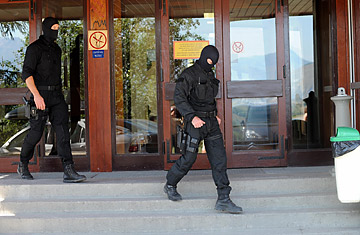
Officers of the French anti-terrorist squad RAID leave a ski resort building where police arrested three armed alleged members of the Basque separatist group.
Experience has shown it's foolish to ever consider a terrorist group definitively beaten. Still, it must be getting hard for officials in Spain and France not to strut a tiny bit following the recent blows they've dealt the separatist Basque organization Euskadi Ta Askatasuna (ETA). In the past week alone, authorities have unearthed 13 ETA weapons caches in France, and arrested three alleged members suspected of staging two recent bombings in Spain. Nevertheless, officials describe the group as just as dangerous as ever.
"These discoveries deprive ETA of an arsenal [but show that] attacks were being prepared," French Interior Minister Brice Hortefeux said during a Wednesday press conference in Paris after meeting with his Spanish counterpart Alfredo Perez Rubalcaba. "It means the threat is very real, and that we must not underestimate ETA's capacity to cause trouble and its willingness to kill."
The 13 French raids across southern France turned up no less than 48.5 lbs (22 kg) of PETN explosives, guns and ammunition, fuses, detonators, and a total of 352 lbs (160 kg) of ammonium nitrate, which can be used to make bombs. The PETN explosives matched those used in the July 29 ETA bombing of a police barracks in Burgos in northern Spain that injured around 40 people. Investigators say they believe materials in the caches can also be traced to the ETA car bomb that exploded on July 30 on the tourist-packed island of Majorca, killing two Spanish police officers.
The French raids — executed on information provided by Spain — came in the wake of the Aug. 19 arrest of three suspected ETA members at an Alpine ski resort. Aitzol Etxaburu Arteche, 30, Andoni Sarasola, 36, and Alberto Machain Beraza, 28, are now being held as French investigators assemble a case against them for belonging to an outlawed organization and suspected involvement in terrorist activity. Not only have these police coups struck a staggering blow to ETA's potential to carry out attacks, they also represent a symbolic slap in the face coming as they do less than a month after the organization marked its 50th anniversary of armed struggle for an independent Basque homeland with the bombings in Burgos and Majorca.
"The last half decade has been hard on ETA, but the timing of these busts must be particularly agonizing," says a French anti-terrorism official of the recent police operations. "Compared to what it used to be, ETA is scarcely a fragment of its former self now."
Why have things gotten so hard for ETA? The weakening of the group is in large part due to a revolutionary change in French attitudes. Until the early 1990s, the French viewed ETA violence as Spain's problem so long as France wasn't attacked. And as a hedge against that happening, Paris benignly ignored the ETA logistical and planning networks that were preparing strikes on Spain from France's Basque country. But when Algerian jihadists unleashed terror attacks in France in 1995, Paris was awakened to the importance of cross-border cooperation in battling extremists. It kicked its then-nascent anti-ETA efforts with Spain into high gear — and hasn't let up since.
Today, 172 suspected or convicted ETA members are serving time in French prisons, 157 of them Spanish nationals. In Spain itself, there are close to 750 currently in jail. Increased coordination between Paris and Madrid, meanwhile, made things so hot for ETA that its networks started searching for other places to plot strikes. "They tried Portugal, they even tested Morocco, but authorities in those countries saw the results of our cooperation and slammed the door on ETA before it could set up shop," the French official says. "We're all sharing information on ETA and moving to smoke it out. Times are very hard for the organization."
Perhaps, but as Interior Minister Hortefeux noted on Wednesday, each time authorities deal a blow to ETA they also uncover further proof that whatever is left of the organization is still busy preparing more of the attacks that have killed around 800 people over the years. Meanwhile, officials say that with the group now under unprecedented pressure, the only — usually young — people willing to enter ETA these days are almost all driven by an extremism that knows no fear of failure.
"The more you pare it down in size, the harder a core you're going to be left with," says the French official. "So even if it's smaller and more limited in movement, ETA today has gone deeper underground, hardened in its radicalism, and become less predictable. As the saying goes, an animal is most dangerous when it's wounded."
Meaning, until ETA can definitively be declared dead, Spanish and French authorities remain wary of the threat that injured beast still poses — and they won't be declaring ultimate victory any time soon.
Download the new TIME BlackBerry app at app.time.com.
